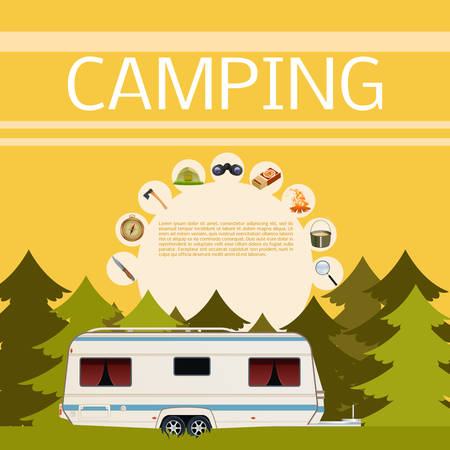Introduction to Eco-Friendly Bike Camping in the UK
Across the rolling hills and vibrant countryside of the UK, a new wave of adventure is gaining momentum—eco-friendly bike camping. This sustainable way of touring is quickly becoming a favourite among families and nature-lovers who want to explore Britain’s beauty while treading lightly on the environment. Whether you’re pedalling through the Lake District, following gentle trails in the Cotswolds, or venturing along coastal paths in Cornwall, eco-friendly bike camping offers an inviting alternative to traditional holidays. But why does practising sustainability matter so much? For many, it’s about leaving a positive legacy for their children and ensuring that our treasured landscapes remain unspoilt for generations to come. Embracing this mindful approach not only helps protect wildlife and habitats but also fosters stronger family bonds as you work together to minimise your impact. Let’s discover how eco-conscious touring is reshaping UK adventures, making lasting memories for families and offering peace of mind for everyone who loves the great outdoors.
2. Planning a Green Bike Tour
Embarking on an eco-friendly bike camping adventure in the UK starts with mindful planning. Thoughtful choices at this stage help reduce your environmental footprint and ensure a smoother, more enjoyable journey for your family. Here are some essential tips for planning a green bike tour that makes the most of local cycling culture and the beautiful British landscape.
Choosing Local Cycling Routes
The UK boasts a fantastic network of cycle paths, from scenic Sustrans National Cycle Network routes to tranquil country lanes winding through picturesque villages. Opting for local routes minimises travel emissions and supports community initiatives. Look for well-maintained traffic-free paths or signposted bike trails that pass through nature reserves, coastlines, or heritage sites. Using resources like Sustrans route planner or local cycling group recommendations can help you find safe, family-friendly options.
Utilising Public Transport
Combining cycling with public transport is a smart way to cover longer distances without relying on private cars. Trains, buses, and even ferries across the UK often welcome bikes—especially outside peak hours. Remember to check each service’s specific bike policy before travelling. Below is a handy comparison to help you plan:
| Transport Type | Bike Policy | Booking Needed? |
|---|---|---|
| National Rail (Trains) | Bikes allowed on most services; restrictions during rush hour | Some routes require reservations |
| Coaches (e.g., National Express) | Limited space; folding bikes preferred | Advance notice recommended |
| Ferries | Bikes usually welcomed; extra fee may apply | No booking needed for bikes, but check peak times |
Selecting Low-Impact Campsites
The choice of campsite plays a big part in keeping your trip sustainable. Many UK campsites now prioritise eco-friendly practices such as recycling, renewable energy use, and wildlife conservation. Choose certified ‘green’ campsites or small-scale farm stays that encourage minimal waste and respect for local habitats. Wild camping is legal in parts of Scotland and possible elsewhere with landowner permission—always follow the Leave No Trace principles to keep these spaces pristine for future families.
Quick Tips for Eco-Friendly Camping Choices:
- Look for sites with Green Tourism awards or similar certifications.
- Avoid overcrowded hotspots—smaller, lesser-known sites help spread visitor impact.
- If wild camping, pitch late and leave early without leaving a trace.
- Respect local wildlife by keeping noise down and sticking to established paths.
A Little Family Reminder:
Involving children in these decisions can be a fun learning experience! Let them help pick the route or choose the campsite—it encourages responsibility and helps everyone feel invested in protecting our natural treasures while enjoying the great outdoors together.

3. Eco-Conscious Packing Essentials
Setting off on a bike camping adventure across the UK is an exciting way to explore the countryside with your family, but packing thoughtfully is essential for a sustainable journey. Here’s a handy guide to help you choose gear that’s gentle on the planet and well-suited to Britain’s ever-changing weather.
Choose Reusable and Lightweight Gear
When it comes to eco-friendly bike touring, every item counts. Opt for reusable water bottles, food containers, and cutlery made from stainless steel or bamboo—perfect for family picnics by a scenic loch or hillside. Lightweight, collapsible cookware and compact camp stoves minimise bulk and make life easier when cycling through winding country lanes. Look out for tents and sleeping bags made from recycled materials, ensuring your overnight stays tread lightly on the land.
Zero-Waste Toiletries: Good for You, Better for Nature
Keep your wash kit simple and sustainable by packing solid shampoo bars, biodegradable soap, and toothpaste tablets. Swap single-use wipes for reusable flannels or muslin cloths, ideal for freshening up after a day of pedalling in the British drizzle. Remember to bring a small bag for collecting any rubbish, so you can always leave your campsite spotless—just as you found it.
Packing for the British Weather
The UK’s weather is famously unpredictable, so be prepared! Layering is key: pack moisture-wicking base layers, a cosy fleece, and a reliable waterproof jacket. Don’t forget lightweight gloves and a hat—essential for those crisp mornings by the lake. Quick-drying clothing helps if you’re caught in an unexpected shower (which is all part of the UK adventure!). Choose items that are durable and versatile to keep your pack light and your family comfortable throughout your journey.
4. Leave No Trace: UK Principles and Etiquette
When embarking on an eco-friendly bike camping adventure across the UK, it’s essential to follow the “Leave No Trace” principles that help preserve Britain’s treasured landscapes. By following step-by-step guidance rooted in local customs and countryside codes, you ensure both the wildlife and the rolling hills remain beautiful for generations of explorers—big and small.
Respecting Local Wildlife
- Observe Quietly: Enjoy watching birds, deer, or even hedgehogs from a respectful distance. Avoid loud noises that could disturb nesting or feeding animals.
- Stay on Marked Paths: Stick to bridleways and public footpaths to protect sensitive habitats and reduce erosion.
- No Feeding: Refrain from feeding wild animals, as human food can harm them and alter natural behaviours.
Proper Rubbish Disposal
| Type of Waste | What To Do |
|---|---|
| General Litter | Carry all rubbish with you until you find a proper bin or recycling point. |
| Food Scraps | Seal in a bag and dispose of off-site, as leftovers can attract wildlife. |
| Biodegradable Items | Bury at least 15 cm deep if no bins are available, away from water sources (following local guidelines). |
The Countryside Code: A British Tradition
The Countryside Code is the foundation for responsible outdoor behaviour in the UK. Here’s how you can uphold these values:
- Close Gates Behind You: Always shut gates to protect livestock and crops.
- Leave What You Find: Don’t pick wildflowers or remove rocks; keep nature intact for others to enjoy.
- Be Friendly: Greet fellow walkers, cyclists, and landowners with a smile—it’s part of British charm!
- Avoid Fires: Use a portable stove instead of making open fires, especially in dry seasons or protected areas.
Step-by-Step Guide: Leave No Trace on Your Bike Camping Trip
- Plan your route using official maps and check local regulations for camping and cycling.
- Pack reusable containers and minimise packaging before leaving home.
- Select campsites well away from water sources and marked trails.
- Tidy up every site before departing—even if someone else left litter behind.
- Share what you’ve learned about sustainable touring with family and friends!
A Little Note for Families
If you’re adventuring with children, turn these practices into fun challenges—who can spot more wildlife quietly, or who remembers to close every gate? Teaching kids to care for the countryside helps build lifelong respect for nature, ensuring Britain’s green spaces stay magical for everyone.
5. Sourcing Local and Sustainable Food
When embarking on a family bike camping adventure across the UK, one of the most rewarding eco-friendly choices you can make is to source your food locally and sustainably. Not only does this support British farmers and reduce food miles, but it also offers a chance for meaningful family interactions and learning opportunities about where our food comes from.
Support Local Farmers’ Markets
Visiting local farmers’ markets along your cycling route is a fantastic way to discover fresh, seasonal produce while directly supporting small-scale growers. Many towns and villages in the UK host weekly markets, brimming with fruit, vegetables, bread, cheese, and even locally made jams. Make it a fun family activity: give each child a small shopping list or ask them to help choose ingredients for your next meal. This not only fosters independence but also encourages children to try new foods.
Choose British Produce
When shopping for supplies, opt for British-grown fruits and vegetables wherever possible. Look out for labels such as “Red Tractor” or “LEAF Marque,” which indicate high standards of farming and sustainability. Emphasising local produce reduces the environmental impact of transporting goods long distances and helps maintain traditional British farming practices. It’s also a brilliant way to introduce the family to regional specialities—perhaps some Kentish apples or Cornish potatoes!
Eco-Friendly Meal Preparation
Sustainable meal prep while camping can be simple and enjoyable. Plan easy-to-cook recipes that require minimal packaging and waste—think hearty vegetable stews, sandwiches with local cheese, or oat porridge with berries picked along the way. Bring reusable containers, cutlery, and cloth napkins to avoid single-use plastics. Teach children how to responsibly dispose of food scraps by using compost bins provided at many campsites or packing waste out if necessary.
Family Tip: Cook Together Outdoors
Involve everyone in meal prep by setting up a little outdoor kitchen at your campsite. Assign roles—someone can wash veggies, another can stir the pot, and little ones can set the picnic blanket. Not only does this make cooking a team effort, but it also creates lasting memories under the open sky.
Nurturing Respect for Nature
By sourcing local food and making sustainable choices together, families can nurture respect for both the environment and the people who grow our food. Every small decision—whether it’s choosing British strawberries or preparing meals with love—helps protect Britain’s beautiful landscapes for generations of cyclists and campers to come.
6. Engaging Kids in Sustainable Practices
Introducing children to eco-friendly habits during a bike camping adventure across the UK is not only rewarding, but also a fantastic way to nurture a lifelong appreciation for nature. Making sustainability fun and accessible ensures that young campers stay engaged and excited about protecting the environment. Here are some delightful, age-appropriate activities to inspire eco-minded behaviours while touring Britain’s beautiful countryside.
Nature Scavenger Hunts
Turn your cycling stop-offs into educational treasure hunts! Encourage kids to look for native wildflowers, spot local birds, or collect fallen leaves (never picking live plants). Use illustrated checklists or printable spotter guides from organisations like The Wildlife Trusts, making each find a little celebration. This fosters observation skills and respect for local flora and fauna.
Litter-Picking Challenges
Equip children with gloves and biodegradable bags for a friendly litter-pick around campsites or picnic spots. Frame it as a game—who can collect the most rubbish?—and talk about why leaving no trace matters. Not only does this tidy up shared spaces, but it also helps children understand their role in caring for the environment.
Eco-Art Projects
Let creativity flow by crafting art from natural items found on the ground, such as twigs, pebbles, or pinecones. Encourage kids to build miniature dens for woodland creatures or make wildflower mandalas. Always remind them to use only what’s already fallen and to leave habitats undisturbed, reinforcing gentle stewardship of nature.
Sustainable Snack Time
Involve little ones in preparing zero-waste snacks before setting off on your ride. Let them help pack reusable containers with British-grown fruit or homemade flapjacks wrapped in beeswax wraps. On the trail, encourage them to carry their own reusable water bottles and discuss the impact of single-use plastics.
Storytelling Around the Campfire
At day’s end, gather for stories that celebrate British wildlife and legendary landscapes—from tales of red squirrels in Northumberland to myths from the Lake District. Invite children to share their own observations from the day or imagine adventures for local animals. These moments cement emotional connections with nature.
Leading by Example
The most effective way to instil eco-friendly values is through shared experiences. Show children how you recycle rubbish at camp, choose low-impact products, and stick to designated trails. By modelling these behaviours—and explaining their importance—you’ll empower your young explorers to become confident guardians of the UK’s natural treasures for years to come.
7. Conclusion: Creating Lasting, Positive Memories
Eco-friendly bike camping in the UK offers families a unique opportunity to bond while treading lightly on the land. By embracing sustainable touring practices—from packing reusable gear to respecting local wildlife and staying on designated paths—we not only protect the breathtaking beauty of the British countryside but also set a heartfelt example for our children. Each shared pedal stroke, every story told under canvas, and all those moments spent marvelling at wildflowers or ancient woodlands create memories that last well beyond the journey itself. In doing so, we nurture not just our family relationships but also a sense of responsibility towards these green spaces. As we pass down a love for adventure and care for nature, we ensure that future generations can continue to explore and cherish the UKs remarkable landscapes together. Ultimately, sustainable bike camping is more than an eco-conscious choice—it’s an invitation to slow down, connect deeply with our loved ones, and leave a positive legacy for the children who will follow in our tyre tracks.


